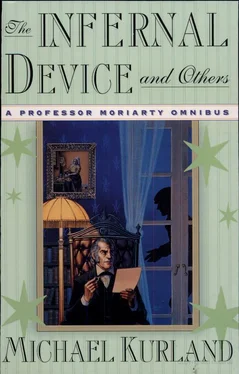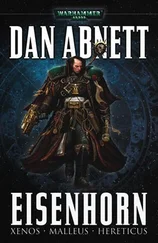"What sort of comfort, Professor?" Barnett asked, feeling that he had lost the thread of the conversation.
"I find solace in the theories expounded by Professor Herschel, among others, concerning nebulae," Moriarty said, pouring himself a cup of coffee from the large silver samovar which squatted at one end of the table. "They would suggest that the universe is larger by several orders of magnitude than previously imagined."
"This comforts you?"
"Yes. It indicates that mankind, confined as it is to this small planet in a random corner of the universe, is of no real importance or relevance whatsoever."
Barnett put his spoon carefully down on the side of his plate. He knew that Moriarty indulged in these misanthropic diatribes at least partly to annoy him, but at the same time he had never seen any sign that the professor was not totally serious about what he said. "I don't suppose you'd care to do a piece for my news service on that general theme, Professor?" Barnett asked.
"Bah!" Moriarty replied.
"I could probably get a couple of hundred American newspapers to carry the piece."
"The prospect of having my words read eagerly over the jam pot in Chicago is, I must confess, one that holds no particular charm for me," Moriarty said. "Having my phrases mouthed in San Francisco, or my ideas hotly debated in Des Moines, has equally little appeal. No, I'm afraid, my dear Mr. Barnett, that your offer will not entice me into a journalistic career."
"I'm sorry about that, Professor," Barnett said. "The world lost a great essayist when you chose to devote yourself to a life of, ah, science."
Professor Moriarty looked at Barnett suspiciously. "When I plucked you from a Turkish prison almost two years ago," he said, "you were as devoid of sarcasm as you were embedded with grime. I no longer detect any grime."
"Touch é, Professor." Barnett smiled and poured himself a cup of coffee.
-
Benjamin Barnett had first met Professor James Moriarty in Constantinople almost two years before, at a moment when the professor was being chased down the Street of the Two Towers by a band of assassins in dirty brown burnooses. Barnett and a friend came to the professor's aid, for which he thanked them profusely, although he regarded the assault as a minor annoyance from which he could have extricated himself quite easily without assistance. Which, Barnett came to admit when he got to know the professor better, was most probably true.
Moriarty had reciprocated by rescuing Barnett from the dank confines of the prison of Mustafa II, where he was being held for the minor offense of murdering his friend and the major indiscretion of spying against the government of that most enlightened despot Sultan Abd-ul Hamid, Shah of Shahs, the second of that name. Both crimes of which he was equally innocent, and for either of which he was equally likely to be garroted at any moment at the whim of the Sublime Porte.
But Moriarty had exacted a price for his rescue. "What I want from you," he had told Barnett, "is two years of your life."
"Why?" Barnett had asked.
"You are good at your profession, and I have use for you."
"And after the two years?"
"After that, your destiny is once again your own."
"I accept!"
It had seemed like a good bargain at the time. And even when Moriarty had smuggled Barnett across the length of Europe and they stood face to face in the professor's basement laboratory in the house on Russell Square, it continued to seem so. Moriarty claimed to be a consultant and problem-solver, but he was strangely vague about the details. After extracting an oath of silence in regard to his affairs, he had put Barnett to work. Barnett had been a foreign correspondent for the New York World, living in Paris, when he had gone to Turkey to report on the sea trials of a new submarine and ended up in an Osmanli prison. It was his skills as a reporter that Moriarty wished to use. With Moriarty's assistance, Barnett opened the American News Service, a cable service to United States newspapers for British and European news. This gave Barnett a cover organization to investigate anything that Moriarty wanted investigated. To the surprise of both men, the service quickly began to make money, and soon took on a life of its own as a legitimate news organization.
Gradually it dawned on Barnett that Moriarty's ideas of law and morality were at variance with those of the rest of Victorian society. Moriarty, to put it bluntly, was a criminal. Sherlock Holmes, the brilliant consulting detective, considered Moriarty one of the most reprehensible villains in London as yet unhanged. This was, perhaps, an exaggeration. Holmes had been trying to catch Moriarty at some nefarious scheme or other for nearly a decade, and had yet to succeed. He had foiled one or two of the professor's plans, and apprehended a henchman or two; but he had never managed to link the crime in question to the quondam professor of mathematics now living in Russell Square. This had undoubtedly led to a certain pique, and a tendency to see Moriarty under every bush and a sinister plot behind every crime.
Professor Moriarty was not a simple criminal any more than he was a simple man. He had his own morality, as strict as or stricter than that of his contemporaries. But it differed in tone as well as in content from that smug complacency with which Victoria's subjects regarded "those lesser breeds without the law" unfortunate enough to be born in Borneo, or Abyssinia, or Whitechapel.
Moriarty had kept Barnett isolated from most of his criminal activities, finding Barnett more useful as an unbiased gatherer of information. As a result, Barnett had only hints of the organization that Moriarty commanded, or the activities that he directed. Barnett did know that whatever money Moriarty made from his activities, beyond that necessary to keep up his household, went into supporting his scientific experiments. Moriarty thought of himself as a scientist, and his other activities, legal and illegal, were merely the means of financing his inquiries into the scientific unknown.
-
Barnett stared at the tall, hawklike man across the breakfast table from him. Moriarty was an enigma: an avowed criminal, he had the highest intellectual and moral standards Barnett had ever known; an evident misanthrope, he quietly supported several charities in the most miserably poor sections of London; a confirmed realist, he showed an irrepressible inclination toward the romantic. It might not be that he sought out adventure; but however he might hide from it, it unerringly sought him out.
"You've always been interested in puzzles," Barnett said, breaking off his chain of thought as Moriarty noticed his fixed gaze. "Doesn't the image of a man murdered inside a locked room appeal to you?"
Moriarty thought over the question for a moment. "Not especially," he said. "I'd need more information than is given in the Morning Herald before I find it puzzling. The way they leave it, there are too many possible answers only because there are too many unasked questions."
"For example?"
"What of the windows, for example?"
"Locked. It says so."
"Of course. But what sort of locks? There are gentlemen, I believe, who can open a locked window from the outside."
"And then leave through the window, locking it after them?"
"In some cases, yes, depending upon the type of lock. Or, for example, the murderer could have concealed himself in a cupboard, or under the bed, and not left until after the body was discovered."
"I hadn't thought of that," Barnett said.
"I can list five other ways in which the supposed 'locked room' could have been circumvented," Moriarty said.
"I take it back," Barnett said, laying the newspaper face down on the table next to the chafing dish. "There is no puzzle. I was mistaken."
Читать дальше












